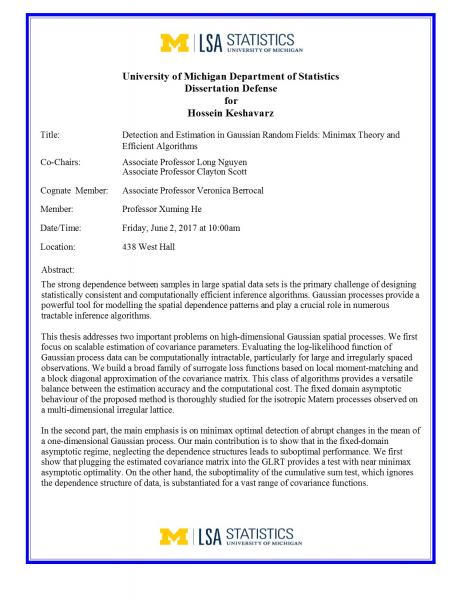Dissertation Defense: "Detection and Estimation in Gaussian Random Fields: Minimax Theory and Efficient Algorithms:
Hossein Keshavarz
Abstract:
The strong dependence between samples in large spatial data sets is the primary challenge of designing statistically consistent and computationally efficient inference algorithms. Gaussian processes provide a powerful tool for modelling the spatial dependence patterns and play a crucial role in numerous tractable inference algorithms.
This thesis addresses two important problems on high-dimensional Gaussian spatial processes. We first focus on scalable estimation of covariance parameters. Evaluating the log-likelihood function of
Gaussian process data can be computationally intractable, particularly for large and irregularly spaced observations. We build a broad family of surrogate loss functions based on local moment-matching and a block diagonal approximation of the covariance matrix. This class of algorithms provides a versatile balance between the estimation accuracy and the computational cost. The fixed domain asymptotic behaviour of the proposed method is thoroughly studied for the isotropic Matern processes observed on a multi-dimensional irregular lattice.
In the second part, the main emphasis is on minimax optimal detection of abrupt changes in the mean of a one-dimensional Gaussian process. Our main contribution is to show that in the fixed-domain asymptotic regime, neglecting the dependence structures leads to suboptimal performance. We first show that plugging the estimated covariance matrix into the GLRT provides a test with near minimax asymptotic optimality. On the other hand, the suboptimality of the cumulative sum test, which ignores the dependence structure of data, is substantiated for a vast range of covariance functions.
The strong dependence between samples in large spatial data sets is the primary challenge of designing statistically consistent and computationally efficient inference algorithms. Gaussian processes provide a powerful tool for modelling the spatial dependence patterns and play a crucial role in numerous tractable inference algorithms.
This thesis addresses two important problems on high-dimensional Gaussian spatial processes. We first focus on scalable estimation of covariance parameters. Evaluating the log-likelihood function of
Gaussian process data can be computationally intractable, particularly for large and irregularly spaced observations. We build a broad family of surrogate loss functions based on local moment-matching and a block diagonal approximation of the covariance matrix. This class of algorithms provides a versatile balance between the estimation accuracy and the computational cost. The fixed domain asymptotic behaviour of the proposed method is thoroughly studied for the isotropic Matern processes observed on a multi-dimensional irregular lattice.
In the second part, the main emphasis is on minimax optimal detection of abrupt changes in the mean of a one-dimensional Gaussian process. Our main contribution is to show that in the fixed-domain asymptotic regime, neglecting the dependence structures leads to suboptimal performance. We first show that plugging the estimated covariance matrix into the GLRT provides a test with near minimax asymptotic optimality. On the other hand, the suboptimality of the cumulative sum test, which ignores the dependence structure of data, is substantiated for a vast range of covariance functions.
| Building: | West Hall |
|---|---|
| Event Type: | Lecture / Discussion |
| Tags: | Dissertation, Graduate |
| Source: | Happening @ Michigan from Department of Statistics |


